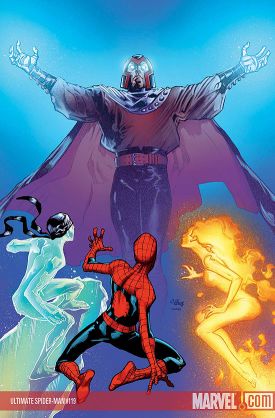Ultimate Spider-Man #119
By Zak Edwards
March 8, 2008 - 18:54
Marvel Comics
Writer(s): Brian Michael Bendis
Penciller(s): Stuart Immonen
SPOILERS PRESENT
So Liz Allen is Firestar. Liz Allen has become what she hates more than anything in the entire world: a mutant. But by the end of issue #119 of Ultimate Spider-Man, she’s really okay with it. The “mutant coming to grips with their abilities” is nothing new to the comic book medium, it happens all the time in X-Men comics. Mark Millar has done some wonderful stories in the early Ultimate X-Men comic books using this story mold, but he is also drawing on a concept that has been utilized for decades. So when I am presented with a comic book that uses a very common concept, I have to find if it does something different, something new and fresh with the old ideas. Ultimate Spider-Man has based much of its success off of the fresh reinvention of previously visited concepts, so does it continue to do so? Sort of.
 |
Stuart Immonen had some fun this issue, especially with Iceman. Everywhere in this issue, the background is crowded with Iceman’s slides going off in random directions. It’s really quite humourous. Imagine the dangers of these giant pieces of ice, hundreds of feet in the air. He’s a danger and doesn’t even realize it! Immonen’s scenes with the kids talking have a subdued expression to them, as if they are not really as dramatic as they should be. The words coming out of their mouths make sense, but some places their expressions seem too laid back. But for the scenes with Spider-Man, Iceman, and Liz Allen talking with the fire and the masks and the ice, Immonen performs much better. His action scenes are as amazing as ever and he continues to do a great job without delays.
7/10 Not as perfect a fusion of art and script as the last issue but makes a predictable plot engaging.
Related Articles:
Ultimate Comics: Spider-Man #23 Review
Ultimate Comics: Spider-Man #16.1 Review
Ultimate Comics: Spider-Man #16
Ultimate Comics All-New Spider-Man #13 Review
Ultimate Comics: Spider-Man #8
Ultimate Comics: Spider-Man #4
Ultimate Comics: Spider-Man #3
Ultimate Comics: Spider-Man #2
Ultimate Comics: All-New Spider-Man #1
Ultimate Spider-Man #160
